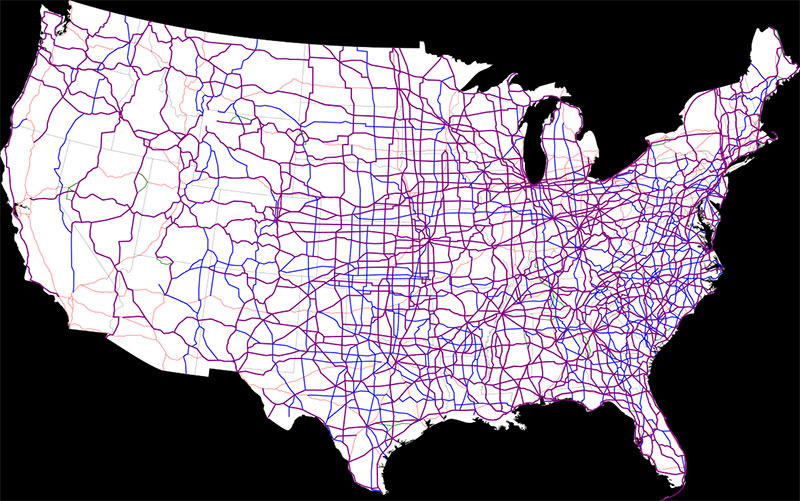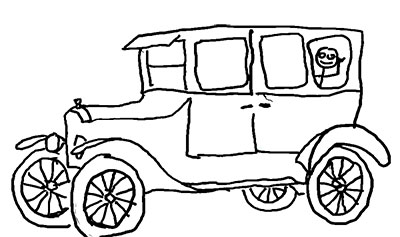
Considering how important traveling is to us, it’s only natural that we have a lot of different names for everything involved in it, particularly the things we travel on.
While it may seem confusing to have an Elm Street in the same city as an Elm Lane, there is an actual purpose behind all the different names we give to places cars use, so in this post, let’s look at the different meanings those words convey in US English.
Get a free sample proofread and edit for your English document.
Two professional proofreaders will proofread and edit your English document.
Road
Of all the terms, “road” is the most inclusive because it just means anything that goes from Point A to Point B. It has no specifications about length, breadth, use, or setting. “I took the road less traveled” is thus so easily a metaphor for life.
Although a few synonyms for “road” are vague (e.g., drag, pike, path), most involve a different specificity.
Route
It’s tempting to think of a “route” as being much the same as a “road,” but the difference lies in the idea of a specific destination. If you know you want to go to, say, New Orleans for Mardi Gras, you’d be interested in the direct route to get there, not just some road to New Orleans.
A route has a goal, which is part of why Route 66 is as much a destination in American culture as a means to a destination.
Street
To be a street, you need buildings on the sides of your public-access road. Streets are often quite wide and busy and are seen in cities more than in towns or the countryside. Streets are usually straight and often appear in grids.
Drive
Pretty much the direct opposite of a street is a drive, a road that conforms to its natural setting, such as a coastline or a mountain, and is typically winding and may be private instead of public (thus, “driveway”).
Drives often involve good views and leisure time, which is why we like to “go for a drive.”
Lane
In contrast, a lane is typically in the country or a small town (or subdivision) and narrow without a median (i.e., neutral ground, strip, divider, or island). “Lane” doesn’t imply the winding nature of the road like “drive” does. People tend to use “lane” when they want to sound provincial, unlike the urban nature of “street.”
Alley
An “alley” is a really narrow road between and among buildings.
Avenue
Understanding the point of “avenue” means contrasting it with “street.” An avenue is also typically urban, straight, and lined by buildings and trees, but when streets and avenues are used together, the street usually travels east–west and the avenue north–south, a distinction that can really help when navigating an unknown city.
Often, avenues have a median.
Boulevard
Take an avenue with a median and make it wider, and you have a boulevard. Boulevards tend to be lined with trees and are associated with nice suburbs, gated communities, and the like.
Way
A “way” is sort of a not-quite road. It’s small and out of the way (which is probably how it got its name).
Highway
Considering the definition of “way,” roads that include “way” in their names are pretty much the opposite.
A highway is big (like, really big) and is a road with controlled access connecting long stretches typically between cities. We associate them with concrete and high maximum (and minimum) speeds. Highways may have tolls (i.e., toll roads or turnpikes), but may not (i.e., expressway).
Freeway
A “freeway” is a highway with no tolls.
Parkway
A “parkway” is a highway with a nice landscape with trees and things.
Throughway (i.e., Thruway)
A “throughway” typically has a toll and is meant for heavy, fast-moving traffic. People often will pay for a throughway to get across a city faster.
Beltway
And again, we’ve got an opposite; a “beltway” typically goes around a city.
Racetrack
Much as with “way” and its variations, a “track” is pretty much the opposite of a “racetrack.” A track can just be a foot-worn path or a bit of rocky terrain with some signs showing where to go. A racetrack is a private, self-enclosed man-made structure that typically requires some sort of admission fee and lets you move your car very, very fast.
Pass
A “pass” is a road that takes the path of least resistance, such as the low point in a mountain range.
And now, let’s finish up with some names for roads that are quite specific indeed.
Rotary
A “rotary” is a road that goes in a circle. They’re often more formal but otherwise the same as a “roundabout.”
Bay
A “bay” is a loop or detour, a bit of road that leaves a main road, does something, and then comes back to that same road.
Terrace
A “terrace” is an elevated road along a slope or hill or around a building or other man-made structure.
Place
A “place” is a road that has no intersections. They’re often short and may have a dead end or “no thru traffic.” They are sometimes shaped like a “P.”
Court
“Courts” are quite similar to “places,” but with a court, you’re definitely talking about a cul-de-sac or traffic loop at the end.
Plaza
Many plazas have no automobile traffic, but those that do have an open, urban space.
There are many other terms, of course. In fact, while writing this, I came up with almost a hundred words for “road,” but I’ve stuck to the most common ones with denotations that give you some expectations as to what sort of road you’ll be dealing with.
Happy motoring!

Julia H.
Get a free sample proofread and edit for your English document.
Two professional proofreaders will proofread and edit your English document.
Get a free sample proofread and edit for your document.
Two professional proofreaders will proofread and edit your document.
We will get your free sample back in three to six hours!